口译材料unit
- 格式:doc
- 大小:26.00 KB
- 文档页数:5
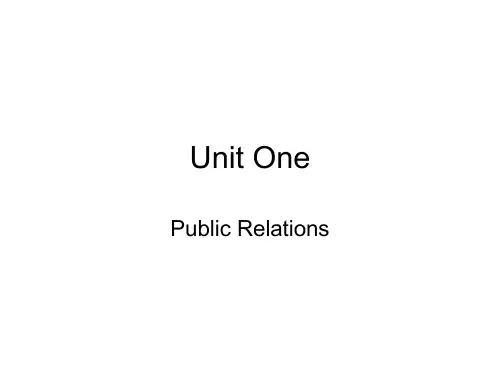

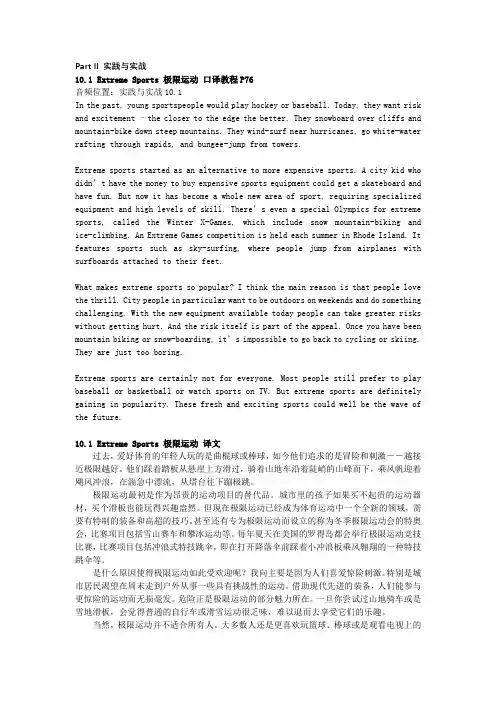
Part II 实践与实战10.1 Extreme Sports 极限运动口译教程P76音频位置:实践与实战10.1In the past, young sportspeople would play hockey or baseball. Today, they want risk and excitement –the closer to the edge the better. They snowboard over cliffs and mountain-bike down steep mountains. They wind-surf near hurricanes, go white-water rafting through rapids, and bungee-jump from towers.Extreme sports started as an alternative to more expensive sports. A city kid who didn’t have the money to buy expensive sports equipment could g et a skateboard and have fun. But now it has become a whole new area of sport, requiring specialized equipment and high levels of skill. There’s even a special Olympics for extreme sports, called the Winter X-Games, which include snow mountain-biking and ice-climbing. An Extreme Games competition is held each summer in Rhode Island. It features sports such as sky-surfing, where people jump from airplanes with surfboards attached to their feet.What makes extreme sports so popular? I think the main reason is that people love the thrill. City people in particular want to be outdoors on weekends and do something challenging. With the new equipment available today people can take greater risks without getting hurt. And the risk itself is part of the appeal. Once you have been mountain biking or snow-boarding, it’s impossible to go back to cycling or skiing. They are just too boring.Extreme sports are certainly not for everyone. Most people still prefer to play baseball or basketball or watch sports on TV. But extreme sports are definitely gaining in popularity. These fresh and exciting sports could well be the wave of the future.10.1 Extreme Sports 极限运动译文过去,爱好体育的年轻人玩的是曲棍球或棒球,如今他们追求的是冒险和刺激――越接近极限越好。
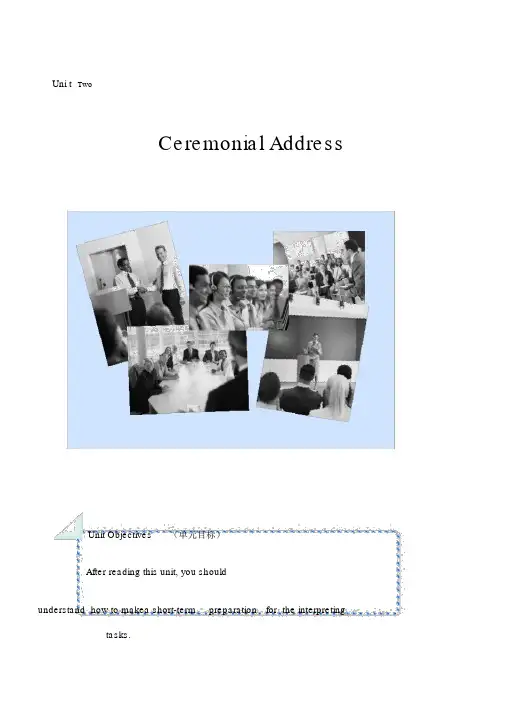
Uni t TwoCeremonial AddressUnit Objectives(单元目标)After reading this unit, you shouldunderstand how to makea short-term preparation for the interpreting tasks.find ways to improve your interpreting skills and performance.master the basic words and expressions about ceremonial address.know some cultural background knowledge about ceremonial address.I. Interpreting Skills( 口译技能 )Read the following presentation about short-term preparation.Try tounderstand what and how to prepare for the interpreting tasks in theshort run. Then complete the following task:Suppose you are going to work as an interpreter for a businessman whois going to make a ceremonial address. How are you going to preparefor it and what questions are you going to ask if you are able to contactthe organizer or the speaker before the interpretation starts? Workin groups and work out a question list.Preparing Training (II): Short-term Preparation(短期准备)Short-term preparation in interpreting refers to the job that can only beprepared shortly before the interpreting task is taken. In contrast with long-termpreparation,short-term preparation is more direct and concrete,as each interpreting task is different from one another. The interpreter works for different speakers and on different subjects. In real interpreting situations,pre-interpreting preparation is usually referred to as short-term preparation.What to Prepare?After an interpreter has accepted an interpreting assignment, they shall start to prepare for the task immediately. Following are the essential items that theinterpreter shall prepare.1. Meeting DocumentsThe meeting documents are a great help to the interpreters. It is advisable for interpreters to ask the organizer to provide the complete documentation(文件) and background information for the task as early as possible, such as the meeting schedule (时间表) , list of participants(参加者), introduction of the keynotespeakers (主题发言人) etc. He must try to understand“who is the speaker? whatis the subject?what is the occasion? who is the audience? and what type of speech is it?” .2. A Glossary ListAfter getting the documents, the interpreter is then able to know the topics and subjects he is going to deal with. At this time, an experienced interpreterwill work out a list of glossary and terminology (术语)he will potentially encounterin interpreting. A prepared glossary list sometimes helps the interpreter out when he comes across new words.3. Dictionaries, Notebooks and PensInterpreting is often done in an uncertain situation. There are always somewords and expressions beyond the interpreter ’s mind and preparation.In this case, some classified dictionaries(分类词典) may be of great help. An experienced interpreter always brings certain dictionaries, which they can consult wheneverpossible. In addition, note-books and pens are also necessary in interpreting. As interpreters usually take notes in interpreting, two top-opening notebooks(竖翻式笔记本)and knock-gell pens(按压式水笔)are therefore recommended for interpreters to carry.Such note books and pens are easily handled in interpreting situations.4. Dresses and Name CardsIn addition, interpreters should know the general dress code(着装要求) before the meeting starts. Interpreters are always expected to dress appropriately andbehave respectfully when they attend the meeting. Moreover, business cards(名片) are also necessary as interpreters sometimes receive name cards from theorganizer and the speakers. Therefore, interpreters should prepare their own cards to offer them in return. Otherwise, it would make them embarrassed.How to Prepare?The following three ways are suggested that interpreter do when making short-term pre-interpreting preparation.1. Read through the Relevant DocumentsBefore an interpreter begins to work, he should read through the documents heis able to obtain and organize all the documents in an easily recognizable way sothat he can find them immediately when the speaker is delivering his speech. Ifhe has translated some of the texts beforehand, he should also classify the translated texts and put them in order.2. Surf the InternetThere is plenty of information in Internet. By surfing the net, the interpreter may find some important information that is related to the interpreting tasks,such as the background of the key-note speakers; the introduction to the related organizations etc.. It is suggested that interpreters find an Internet access and make full use of it.3. Contact the Organizer and the SpeakerBriefings(碰头会)are potentially a very useful part of advance preparation. They are meetings organized for the interpreter, with the participation of theorganizer and the speakers. At the briefing, the interpreter can ask specificquestions and get some general information. Sometimes, some speakers have strong accents. If possible, interpreters should attempt chance to talk personally withsuch participants before the real task begins so as to be familiar with their accents and improve the accuracy of the interpretation.4. Prepare a question listBefore taking the interview with the organizer and the speaker, interpretersare supposed to prepare a question list(提问单)in advance, as both the organizer and the speaker are usually rather busy. The questions must be to the point. Aprepared question list will be of great help during the interviews. Following isa sample question list:A Sample Question ListTo Organizer:1.May I have the schedule? Will there be any changes about the schedule?2. Is it possible for me to have the speakers’ speech drafts or ppt slides?3.Who will attend the conference? Is there a Q & A session?4.Who are the key-note speakers? How can I get in touch with them?To Speaker:1.How long will the speech last?2.What are your main points? Are you going to add or cut any points?3.Are you going to use any technical terms?4.May I have your draft or ppt slides?II. Phrase Interpreting( 短语口译 )Work on the following words and phrases. Interpret them into Chineseand English respectively.A.English to Chinese1.Take this opportunity2. Cherish3.Signing ceremony4. Witness5.Extend sincere thanks to⋯.6. Appreciatest but not least8. Enhance9.At his earliest convenience10. WorkshopB. Chinese to English1、司仪2、嘉宾3、值此⋯⋯之际4、友好使者5、良好祝愿6、衷心感谢7、热情好客8、应⋯⋯的邀请9、代表10、无以伦比的III.Sentence Interpreting(句子口译)Work on the following sentences. Interpret them into Chinese andEnglish respectively.A.English to Chinese1.I feel honored to come here on my first visit to your beautiful city.2.I would like to take this opportunity to extend our sincere thanks to ourhost for their earnest invitation and the gracious hospitality.3.Although there is a distance of tens of thousands of miles between us, "Longdistances separate no bosom friends", as one of your Tang poets once said.4.I greatly cherish thevalue the position wepartners. close relationship between our two cities.I also greatly enjoy as one of your most important trading5.On behalf of the foreign guests attending this workshop, let me offer a mostsincere “thank you ” for you warm and gracious welcome.B.Chinese to English1、我代表中国政府和人民,并以我个人的名义,向贵国人民致以亲切的问候和良好的祝愿。
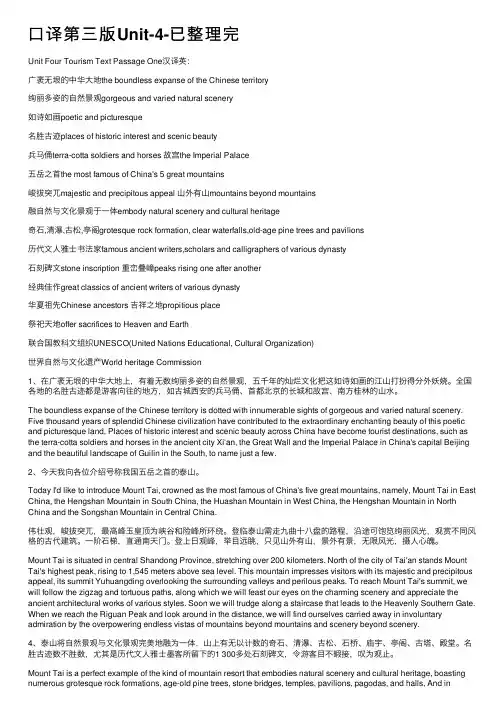
⼝译第三版Unit-4-已整理完Unit Four Tourism Text Passage One汉译英:⼴袤⽆垠的中华⼤地the boundless expanse of the Chinese territory绚丽多姿的⾃然景观gorgeous and varied natural scenery如诗如画poetic and picturesque名胜古迹places of historic interest and scenic beauty兵马俑terra-cotta soldiers and horses 故宫the Imperial Palace五岳之⾸the most famous of China's 5 great mountains峻拔突兀majestic and precipitous appeal ⼭外有⼭mountains beyond mountains融⾃然与⽂化景观于⼀体embody natural scenery and cultural heritage奇⽯,清瀑,古松,亭阁grotesque rock formation, clear waterfalls,old-age pine trees and pavilions历代⽂⼈雅⼠书法家famous ancient writers,scholars and calligraphers of various dynasty⽯刻碑⽂stone inscription 重峦叠嶂peaks rising one after another经典佳作great classics of ancient writers of various dynasty华夏祖先Chinese ancestors 吉祥之地propitious place祭祀天地offer sacrifices to Heaven and Earth联合国教科⽂组织UNESCO(United Nations Educational, Cultural Organization)世界⾃然与⽂化遗产World heritage Commission1、在⼴袤⽆垠的中华⼤地上,有着⽆数绚丽多姿的⾃然景观,五千年的灿烂⽂化把这如诗如画的江⼭打扮得分外妖娆。
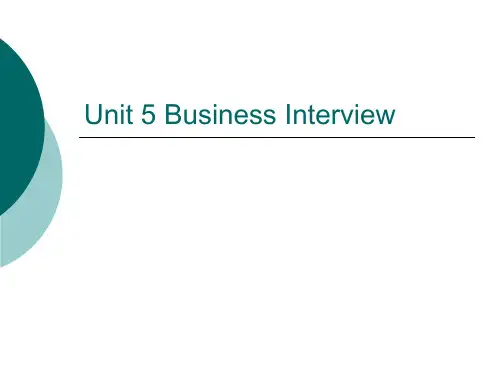
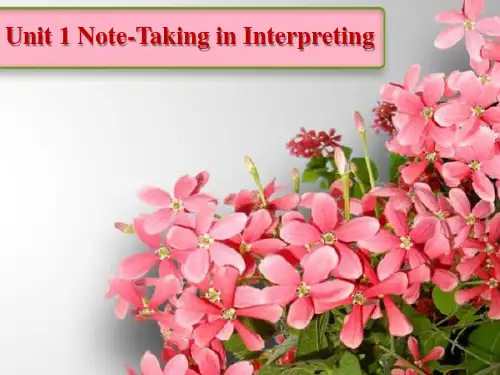
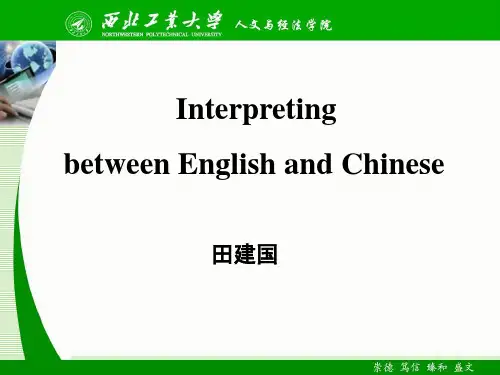
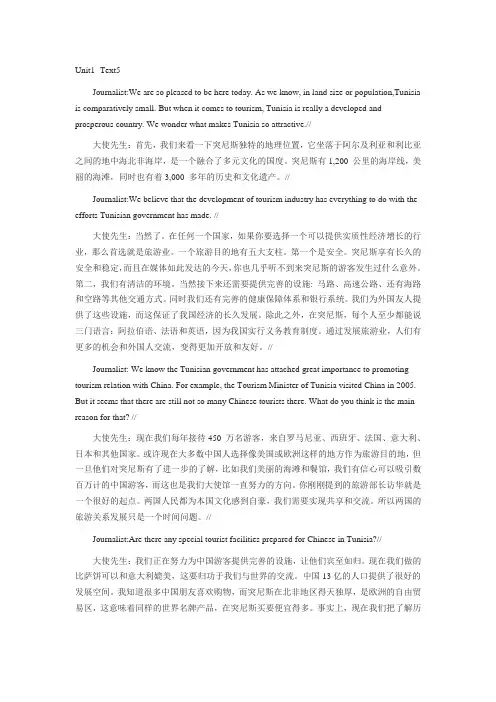
Unit1- Text5Journalist:We are so pleased to be here today. As we know, in land size or population,Tunisia is comparatively small. But when it comes to tourism, Tunisia is really a developed and prosperous country. We wonder what makes Tunisia so attractive.//大使先生:首先,我们来看一下突尼斯独特的地理位置,它坐落于阿尔及利亚和利比亚之间的地中海北非海岸,是一个融合了多元文化的国度。
突尼斯有1,200 公里的海岸线,美丽的海滩,同时也有着3,000 多年的历史和文化遗产。
//Journalist:We believe that the development of tourism industry has everything to do with the efforts Tunisian government has made. //大使先生:当然了。
在任何一个国家,如果你要选择一个可以提供实质性经济增长的行业,那么首选就是旅游业。
一个旅游目的地有五大支柱。
第一个是安全。
突尼斯享有长久的安全和稳定,而且在媒体如此发达的今天,你也几乎听不到来突尼斯的游客发生过什么意外。
第二,我们有清洁的环境。
当然接下来还需要提供完善的设施: 马路、高速公路、还有海路和空路等其他交通方式。
同时我们还有完善的健康保障体系和银行系统。
我们为外国友人提供了这些设施,而这保证了我国经济的长久发展。
除此之外,在突尼斯,每个人至少都能说三门语言:阿拉伯语、法语和英语,因为我国实行义务教育制度。
通过发展旅游业,人们有更多的机会和外国人交流,变得更加开放和友好。
//Journalist: We know the Tunisian government has attached great importance to promoting tourism relation with China. For example, the Tourism Minister of Tunisia visited China in 2005. But it seems that there are still not so many Chinese tourists there. What do you think is the main reason for that? //大使先生:现在我们每年接待450 万名游客,来自罗马尼亚、西班牙、法国、意大利、日本和其他国家。
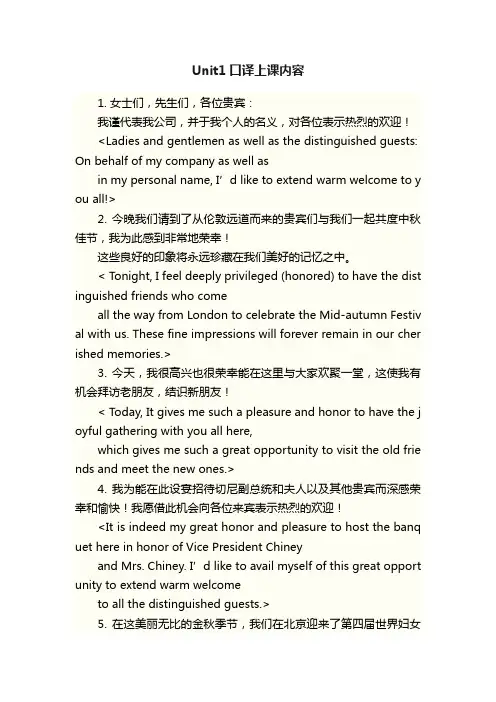
Unit1口译上课内容1. 女士们,先生们,各位贵宾:我谨代表我公司,并于我个人的名义,对各位表示热烈的欢迎!<Ladies and gentlemen as well as the distinguished guests: On behalf of my company as well asin my personal name, I’d like to extend warm welcome to y ou all!>2. 今晚我们请到了从伦敦远道而来的贵宾们与我们一起共度中秋佳节,我为此感到非常地荣幸!这些良好的印象将永远珍藏在我们美好的记忆之中。
< Tonight, I feel deeply privileged (honored) to have the dist inguished friends who comeall the way from London to celebrate the Mid-autumn Festiv al with us. These fine impressions will forever remain in our cher ished memories.>3. 今天,我很高兴也很荣幸能在这里与大家欢聚一堂,这使我有机会拜访老朋友,结识新朋友!< Today, It gives me such a pleasure and honor to have the j oyful gathering with you all here,which gives me such a great opportunity to visit the old frie nds and meet the new ones.>4. 我为能在此设宴招待切尼副总统和夫人以及其他贵宾而深感荣幸和愉快!我愿借此机会向各位来宾表示热烈的欢迎!<It is indeed my great honor and pleasure to host the banq uet here in honor of Vice President Chineyand Mrs. Chiney. I’d like to avail myself of this great opport unity to extend warm welcometo all the distinguished guests.>5. 在这美丽无比的金秋季节,我们在北京迎来了第四届世界妇女大会的召开!为此,我们热烈欢呼第四届世界妇女大会的召开,并预祝大会圆满成功!< In this most beautiful season of golden autumn, we in Beij ing welcome the openingof the 4th World Conference on Women. In this connection, we warmly herald the opening of it and wish it a complete s uccess! >6. 我很荣幸地代表中国政府和人民向来自联合国代表团的代表表示热烈的欢迎!<It is my great honor to express the warm welcome to the d elegates from theUN delegation on behalf of the Chinese Government and its people.>7. 承蒙由如此杰出的人士组成的团体造访本公司,实属莫大的愉快!< It is indeed my pleasure to receive the visit to our compan y fromsuch a distinguished group of talents like you.>8 我想对贵方的友好接待和盛情款待表示衷心的感谢。
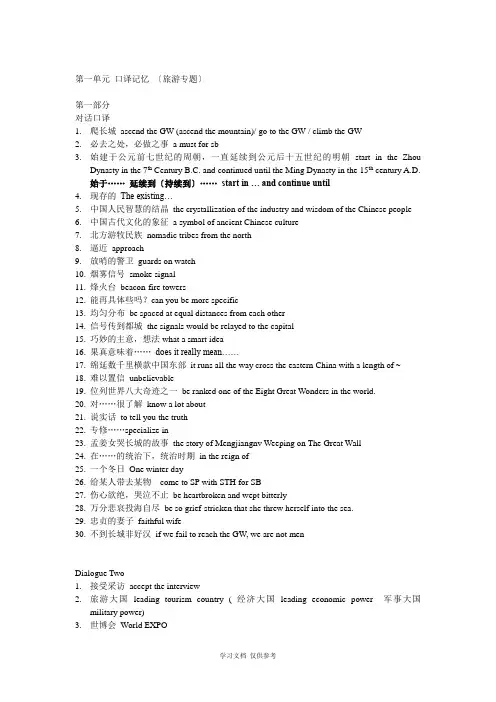
第一单元口译记忆〔旅游专题〕第一部分对话口译1.爬长城ascend the GW (ascend the mountain)/ go to the GW / climb the GW2.必去之处,必做之事a must for sb3.始建于公元前七世纪的周朝,一直延续到公元后十五世纪的明朝start in the ZhouDynasty in the 7th Century B.C. and continued until the Ming Dynasty in the 15th century A.D.始于……延续到〔持续到〕……start in … and continue until4.现存的The existing…5.中国人民智慧的结晶the crystallization of the industry and wisdom of the Chinese people6.中国古代文化的象征a symbol of ancient Chinese culture7.北方游牧民族nomadic tribes from the north8.逼近approach9.放哨的警卫guards on watch10.烟雾信号smoke signal11.烽火台beacon-fire towers12.能再具体些吗?can you be more specific13.均匀分布be spaced at equal distances from each other14.信号传到都城the signals would be relayed to the capital15.巧妙的主意,想法what a smart idea16.果真意味着……does it really mean……17.绵延数千里横款中国东部it runs all the way cross the eastern China with a length of ~18.难以置信unbelievable19.位列世界八大奇迹之一be ranked one of the Eight Great Wonders in the world.20.对……很了解know a lot about21.说实话to tell you the truth22.专修……specialize in23.孟姜女哭长城的故事the story of Mengjiangnv Weeping on The Great Wall24.在……的统治下,统治时期in the reign of25.一个冬日One winter day26.给某人带去某物come to SP with STH for SB27.伤心欲绝,哭泣不止be heartbroken and wept bitterly28.万分悲哀投海自尽be so grief-stricken that she threw herself into the sea.29.忠贞的妻子faithful wife30.不到长城非好汉if we fail to reach the GW, we are not menDialogue Two1.接受采访accept the interview2.旅游大国leading tourism country ( 经济大国leading economic power 军事大国military power)3.世博会World EXPO4.在旅游管理上对中国具有较大的借鉴价值——> 其旅游管理经验对中国来说是一笔财富its rich experience in tourism operation is a valuable asset to China5.旅游收入占到GDP的百分之十二the tourism revenue has reached 12% of GDP6.具体包括哪些?What is included (in the revenue)?7.餐饮业catering8.有变化吗?is there any changes in (this definition)9.共同投资joint investment10.在那些方面in what ways11.促进城市发展promote the development of the city12.国际大都市形象the image of international metropolis13.更好的举办to be a better host of (the EXPO)14.我建议I suggest that15.改良和修缮现有公共设施improve and renovate the existing facilities.16.面临亏损face a financial loss17.盈利make profit18.不赔不赚break even19.政府补贴government subsidies20.最终亏损了end with a loss of $21.弥补亏损make up for the losses22.被认为是be counted as23.商业发展和文化潮流中心a center for business development and cultural waves24.治安很好good public security25.这很关键this is definitely a key factor for26.感谢参与thank you for your participation27.跟你的谈话很愉快it is very nice talking to youPart five1.外汇收支foreign exchange revenue2.年均增长率-- annual average growth of --3.位居世界第三be ranked third worldwide4.来华旅游人次 多少人来中国旅游5.表达在百分之八的年均增长率representing an average 8% increase annually6.国内旅游业总收入将到达revenue from domestic tourism will reach $7.占GDP的百分之八左右represent 8% of GDP8.直接和间接创造就业岗位create direct and indirect job opportunities1.十一五计划the eleventh five-year plan2.关键战略提升期crucial strategic period for upgrading3.面临新的发展机遇和挑战4.在……的地位不断提升raise its status in the (national economy )5.将旅游业〔地位〕提升为promote the tourism as6.支柱产业pillar industry7.先导产业pioneering industry8.重要产业crucial industry9.进一步优化宏观环境further optimize the Macro-environment10.随着建设全面小康社会的推进accompanied by the progress of the development of thewell-off society11.将实现人均GDP从1000到3000的跨越→人均GDP将从1000跳跃至3000 → jump from1000 to 300012.最重要的驱动力paramount driving force13.持续兴旺sustainable boomParagraph 31.随着……〔其综合功能〕的进一步加强while seeing its strengthened (comprehensivefunctions)2.旅游综合功能comprehensive tourism functions3.在……方面发挥更为积极的作用have a further active role to play in doing sth4.扩大内需expanding domestic demand5.拉动投资attracting investment6.带动脱贫helping shake off the poverty7.促进(当地经济)发展giving impetus to (the regional economical development)8.城镇化建设urbanization development9.促进……的建设push forward the development of ….10.全面提升……素质improve the comprehensive tourism quality11.综合发挥〔旅游产业〕功能give full play to the 〔tourism industry〕funtion12.把……培养成为→通过此方式,它将成为→ in this way, it will become13.国民经济national economy14.为……夯实基础lay a solid foundation for15.为……作出积极奉献contribute a great deal to doing16.全面建设小康社会,构建和谐社会creating a well-off and harmonious society1.It is indeed most appropriate that 做……无疑是很合适的2.rich and diverse cultural heritage 丰富而多样的文化遗产3.it is not sheer coincidence that Yogyakarta was chosen as the host venue〔举办地〕regardingcultural tourism development 被选为文化旅游的举办地并非偶然〔并不奇怪〕4.2005 represents a milestone year for tourism. 2005年对于旅游来说是具有里程碑意义的一年5.the year began immediately following the devastating events of the Tsunami 新年刚开始就遇到了飓风6.make a significant impact on the 对……产生重大影响7.world tourism not only demonstrate its strong resilience〔反弹,恢复〕to recover, but alsosurpassed the 800 million mark for international tourist arrivals. 世界旅游业不仅表现出强劲的恢复势头,同时突破了800万游客人数大关8.several uncertainties remain not least 〔不仅仅〕terrorism, ……9.the pattern of 〔情况,情形〕world tourism for 2006 suggests that the industry remainsfirmly in positive territory 〔乐观的状况〕with further growth potential.2006年世界旅游的发展情况说明仍然相当乐观10.linkages with local communities 与当地社区的联系11.the conference is aimed at exploring the challenges.12.an issue which has commanded the full focus of the world 一个引起全世界关注的问题13.specialized agency 专门机构14.XX is committed to assisting the ___ towards the achievement of the _____.致力于协助____实现____15.xx can contribute significantly to sth ____, through its proven ability to _______ 对____的奉献是巨大的,这一点已经被其能力所证实16.the Cultural Corridor concept is true testament of how a destination can take advantage of itsworld-class tourist attractions for the benefit of the.17.actively advocate 积极倡导18.Hold a Ministry Meeting on ____ , highlight the challenges and opportunities presented by____ , culminating in _____召开有关___的部长级会议,重点探讨____ 所带来的机遇和挑战,最终签署了_____19.establish ____ Foundation, commence initial activities 设立___基金,开展初期活动20.eliminate poverty / poverty alleviation 消除贫困/缓解贫困21.a wide spectrum of delegates and speakers ranging from …to … 来自各界的代表22.their expertise, insight, and experience will be hugely valuable in providing ……他们的专业知识,见解和经验,在提供……方面具有重要参考价值。
Unit 3 Interp retin g Conver satio ns 会谈口译3—1 Welcom e 欢迎光临Vocabu lary1、邮电 Post and Teleco mmuni catio nscommun icati on①传达,传播,传递Amongthe deaf and dumb commun icati on may be carrie d on by meansof the finger alphab et. 聋哑人可以借手语传递信息。
②传染Spitti ng in public places may lead to the commun icati on of diseas e.在公共场所吐痰可能导致疾病的传染。
③被传播之事(如新闻),消息,信息This commun icati on is confid entia l. 这消息是机密的。
Commun icati ons 交通或通讯设备,(联络各地的)公路,铁路,电话或电报线,无线电a worldcommun icati ons networ k. 世界性通讯网mass commun icati ons media.大众通讯媒介而前辍“tele”表示 over a long distan ce所以这些词: televi sion, telesc ope, teleph one2、感到骄傲和荣幸be very proudand honore dprivil ege 也可以表示荣幸,可它只能做名词或动词,所以在表示荣幸时,应为:It is sb’s privil ege to do sth.3、gracio us invita tion友好邀请当然可以说成frien dly invita tion这里的gra cious还有①亲切的 kind & warm courte sy②优雅的,雅致的 elegan t or beauti ful③有品味的 good taste4、a distin guish ed group杰出人士这里的dis tingu ished意思是 eminen t 卓著的distin guish ed guests嘉宾而 Guestof Honor或 Honore d Guest,翻译成贵宾5、look over the sea 面向大海look over 有①从-----地方看过去②调查 invest igate6、幽默感 senseof humor责任感 senseof respon sibil ity参与感 senseof partic ipati on自豪感 senseof pride时间感 senseof timing归属感 senseof belong ing集体归属感 senseof belong ing to the commun ity民族认同感 senseof nation al identi ty7、字面意思 litera l meanin glitera l----word for worda litera l transl ation直译8、下榻 offerreside nce南京一些饭店名称的翻译:金陵饭店 Jinlin g Hotel南京玄武饭店 Nanjin g Xuanwu Hotel假日酒店 Holida y Inn南京古南都饭店 Nanjin g GrandHotel南京新纪元大酒店 Nanjin g New Era Hotel南京金丝利喜来登酒店 Sherat on Nanjin g Kingsl ey Hotel南京丁山香格里拉 Shangr i-La Dingsh an Nanjin g Hotel南京苏宁环球饭店 Suning Univer sal Hotel南京凤凰台饭店 Phoeni x Palace Hotel南京华美达怡华酒店 Ramada Nanjin g Hotel南京维景国际大酒店(原希尔顿) Nanjin g GrandMetrop ark Hotel(former Hilton)南京斯亚花园酒店 Siya Garden Hotel南京侨鸿皇冠酒店(原金鹰皇冠酒店) CrownPlaza南京状元楼酒店 Mandar in Garden Hotel白鹭宾馆 EgretHotel南京国际会议大酒店 Intern ation al Confer enceHotelof Nanjin g湖滨金陵饭店 Jinlin g Resort中心大酒店 Centra l Hotel榴园宾馆 Pomegr anate Garden Hotel典型句型1欢迎来上海,罗伯茨先生。
Unit One美国人的性格大多数美国人十分充满活力和热情。
他们愿意自律但不是被他人所律。
他们以自己民族的独立和自由为傲。
他们做事会采取主动(take the initiative),即使这样做要冒风险也在所不惜。
他们具有勇气,不轻易放弃。
他们可以在任何地方做任何事情,不愿意失业。
他们不想得到政府的照顾(They do not care to be looked after by the government.)。
普通(average)美国人一生会换9到10次工作。
美国人热情友好,但并不是外国人所以为的那样表面化(superficial)。
他们被认为是情绪化的。
当在典礼上看到国旗或参加游行以纪念美国过去的光辉岁月,美国人可能会热泪盈眶。
和家人或朋友的重聚也会令他们情绪激动。
他们喜欢穿着得体,即使“得体”无异于奢华炫耀(even if “correctly”means flamboyantly)。
他们爱吹嘘,尽管多数情况下只不过是说说而已(though often with tongue in cheek)。
虽然他们十分的爱国,他们也会嘲笑自己和自己的国家,会自我批评。
他们对于日常事物有着十分广博的知识,对于自己的城市和州深为关切(have a keen interest in)。
然而外国人有时会抱怨他们对于外界事物毫不关心也毫不了解。
美国人酷爱豪华的气派(have a passion for grandeur)。
他们的摩天大楼,桥梁和水坝往往气势雄伟(splendor),与美国的自然奇观之壮美与恢宏(beauty and scale)相得益彰。
赚钱和拥有可以称得上多的奢侈品,是不是大多数美国人唯一的目标(Is the sole aim of most Americans to make money and possess luxuries which could be called excessive?)?大多数美国人会否认这点,虽然他们大多会为自己通过努力工作而积累财物感到骄傲。
Part II 实践与实战11.1.中医的魅力口译基础P198音频位置:实践与实战11.1如今,隔三差五坐飞机来北京看中医的外国人屡见不鲜。
日前,一位患病的美国医生给北京中医医院打来越洋长途,跟内科专家张志真预约下次看病的时间。
不愿接受激素治疗的他,每三个月坐着飞机到中国来看一次中医,因为确实见效,已坚持了一年多。
像这样的外国人还有很多,他们中有带着病寻访名医的;有旅游累了让中医给放松放松的;也有“小病大养”,要求在这里住院,顺便享受一下药膳和药浴的;还有什么病都没有,就为专程来瞧瞧中医是怎么看病的。
在他们眼里,中医的针灸推拿是那么神秘和优雅。
不远万里看中医,外籍患者的病可谓五花八门。
大到肿瘤,心脏病,小到失眠,肥胖。
各国对中医中药的了解也不尽相同,日本人特别信按摩推拿,欧洲人对针灸情有独钟,美国人爱拔火罐。
时间一长,大夫们总结出外国人看中医的一些规律:圣诞节前后是他们就诊的高峰期,好多人都是利用长假来中国旅游加看病。
外国人对中医中药表现出的虔诚出乎中医大夫们的意料。
一位喀麦隆患者吃过中药后,称中药为“苦咖啡”,并告诉同伴喝“苦咖啡”是一种享受。
皮肤科医生告诉一位法国牛皮癣患者应该注意饮食,病人立刻掏出小本,将什么能吃,什么不能吃一字不落地开出单子。
看来,中医的魅力还真的不小。
11.1.中医的魅力译文Many foreigners fly to Beijing for traditional Chinese medicine (TCM) treatment. The other day, an American patient made a long-distance phone call for a reservation with Doctor Zhang Zhizhen at Beijing Chinese Medical Hospital. Instead of using hormones, he has flown to China every three months for Chinese medical treatment. And it has worked. He kept seeing Chinese doctors for over a year. He is not alone. Some foreignersseek famous doctors for treatment, some just feel tired in their travel and want relaxation through TCM, some simply want to enjoy medical food and baths, and some come all the way here just to see how people are treated with TCM. In their eyes, TCM, like massage and cupping, are very mysterious and graceful.Their diseases are varied, like tumors, heart disease, insomnia and obesity. Their understanding of TCM also differs: Japanese believe in massage, Europeans favor acupuncture, Americans like cupping. Some experienced doctors find the time before and after Christmas is the peak season for treatment, because during the holiday the foreign patients can travel to China to see a doctor.The foreigners’devotion is beyond TCM doctors’expectation. A Cameroonian patient called TCM “bitter coffee”, and recommended it to his countrymen as a sort of enjoyment.A psoriasis patient from France, when being given by the doctor some tips on diet, carefully noted down every word of the instruction. These examples can show how much fascination TCM has.11.2 Medical Advice 口译基础P199音频位置:实践与实战11.2It is never nice to fall sick or ill in a strange country. What happens if you do and need to seek medical help? Let us provide you with some useful medical advice and tips regarding seeking medical help or assistance in China.Though many hospitals in China practice Western medical treatment system, a good percentage practice traditional Chinese medicine (TCM). Increasingly, a large percentage of hospitals now practice a mixture of Western and Chinese medicine. Some can offer a full range of medical services such as operations, check-ups and in-patient facilities while other smaller clinics may simply be able to diagnose the symptoms of minor ailments. The first thing you should know about local medical services is the emergency call number 120. You can call 120 from anywhere. An ambulance will normally arrive in a few minutes but traffic conditions can cause delays.Most Chinese will visit a local hospital. If your company doesn’t cover medical expenses or you can’t find a Western clinic because you are in a much smaller town, you can also try visiting a local Chinese hospital. If you wish to do what the Chinese do, and you’ve decided to see a doctor in a local public hospital, you should have an interpreter accompany you as most of the doctors and nurses don’t speak English fluently. Treatments are mostly western medical techniques including diagnosis, medication, injection or the necessary scans. However, medications can be a mixture of Western and Chinese drugs. Your doctor may give you a prescription for you to buy medicine in a drugstore, most of the time at the lobby of the out-patient section building. Go to a drugstore, show the chemist the prescriptio n and you’ll be given what you need. Medicines in independent drugstores are often cheaper than those in hospital pharmacies.11.2 Medical Advice 译文在陌生的国家生病从来都不是什么好事。
Part II 实践与实战11.1.中医的魅力口译基础P198音频位置:实践与实战11.1如今,隔三差五坐飞机来北京看中医的外国人屡见不鲜。
日前,一位患病的美国医生给北京中医医院打来越洋长途,跟内科专家张志真预约下次看病的时间。
不愿接受激素治疗的他,每三个月坐着飞机到中国来看一次中医,因为确实见效,已坚持了一年多。
像这样的外国人还有很多,他们中有带着病寻访名医的;有旅游累了让中医给放松放松的;也有“小病大养”,要求在这里住院,顺便享受一下药膳和药浴的;还有什么病都没有,就为专程来瞧瞧中医是怎么看病的。
在他们眼里,中医的针灸推拿是那么神秘和优雅。
不远万里看中医,外籍患者的病可谓五花八门。
大到肿瘤,心脏病,小到失眠,肥胖。
各国对中医中药的了解也不尽相同,日本人特别信按摩推拿,欧洲人对针灸情有独钟,美国人爱拔火罐。
时间一长,大夫们总结出外国人看中医的一些规律:圣诞节前后是他们就诊的高峰期,好多人都是利用长假来中国旅游加看病。
外国人对中医中药表现出的虔诚出乎中医大夫们的意料。
一位喀麦隆患者吃过中药后,称中药为“苦咖啡”,并告诉同伴喝“苦咖啡”是一种享受。
皮肤科医生告诉一位法国牛皮癣患者应该注意饮食,病人立刻掏出小本,将什么能吃,什么不能吃一字不落地开出单子。
看来,中医的魅力还真的不小。
11.1.中医的魅力译文Many foreigners fly to Beijing for traditional Chinese medicine (TCM) treatment. The other day, an American patient made a long-distance phone call for a reservation with Doctor Zhang Zhizhen at Beijing Chinese Medical Hospital. Instead of using hormones, he has flown to China every three months for Chinese medical treatment. And it has worked. He kept seeing Chinese doctors for over a year. He is not alone. Some foreigners seek famous doctors for treatment, some just feel tired in their travel and want relaxation through TCM, some simply want to enjoy medical food and baths, and some come all the way here just to see how people are treated with TCM. In their eyes, TCM, like massage and cupping, are very mysterious and graceful.Their diseases are varied, like tumors, heart disease, insomnia and obesity. Their understanding of TCM also differs: Japanese believe in massage, Europeans favor acupuncture, Americans like cupping. Some experienced doctors find the time before and after Christmas is the peak season for treatment, because during the holiday the foreign patients can travel to China to see a doctor.The foreigners’ devotion is beyond TCM doctors’ expectation. A Cameroonian patient called TCM “bitter coffee”, and recommended it to his countrymen as a sort of enjoyment. A psoriasis patient from France, when being given by the doctor some tips on diet, carefully noted down every word of the instruction. These examples can show how much fascination TCM has.11.2 Medical Advice 口译基础P199音频位置:实践与实战11.2It is never nice to fall sick or ill in a strange country. What happens if you do and need to seek medical help? Let us provide you with some useful medical advice and tips regarding seeking medical help or assistance in China.Though many hospitals in China practice Western medical treatment system, a good percentage practice traditional Chinese medicine (TCM). Increasingly, a large percentage of hospitals now practice a mixture of Western and Chinese medicine. Some can offer a full range of medical services such as operations, check-ups and in-patient facilities while other smaller clinics may simply be able to diagnose the symptoms of minor ailments.The first thing you should know about local medical services is the emergency call number 120. You can call 120 from anywhere. An ambulance will normally arrive in a few minutes but traffic conditions can cause delays.Most Chinese will visit a local hospital. If your company doesn’t cover medical expenses or you can’t find a Western clinic because you are in a much smaller town, you can also try visiting a local Chinese hospital. If you wish to do what the Chinese do, and you’ve decided to see a doctor in a local public hospital, you should have an interpreter accompany you as most of the doctors and nurses don’t speak English fluently.Treatments are mostly western medical techniques including diagnosis, medication, injection or the necessary scans. However, medications can be a mixture of Western and Chinese drugs. Your doctor may give you a prescription for you to buy medicine in a drugstore, most of the time at the lobby of the out-patient section building. Go to a drugstore, show the chemist the prescription and you’ll be given what you need. M edicines in independent drugstores are often cheaper than those in hospital pharmacies.11.2 Medical Advice 译文在陌生的国家生病从来都不是什么好事。
但是你真要看病时,该怎么办?以下是对外国人在中国就医时的一些建议。
中国很多医院都是用西医,不过也有很多用中医,而且现在越来越多的医院采用中西医结合疗法。
有的医院设施齐全,可以动手术、做检查或住院;而小的诊所只能看一些小病。
首先你要记住的就是急救电话120。
这个号码任何地方都可以拨打。
除非堵车,一般来说救护车几分钟就到。
大部分中国人会就近看病。
如果你的公司不报销医药费用,或因为你所在的城市太小找不到西式医院,不妨试试当地的中医院。
如果你打算像中国人那样去当地公立医院看病,就必须找个翻译,因为大部分医生和护士英语都不够流利。
医院的治疗基本上都是西方的医疗技术,包括门诊,开药,打针或必要的扫描。
不过,也有中西医结合的药品。
医生或许会给你开个处方,你再去药房买药,一般是在门诊大楼的大厅。
你去药房向药剂师出示你的处方,就会拿到药了。
医院外面的药房药价尝尝会便宜一些。
11.3 门诊口译基础P196音频位置:实践与实战11.3Patient: Excuse me, is this the Internal Medicine Department?医生:这里是内科。